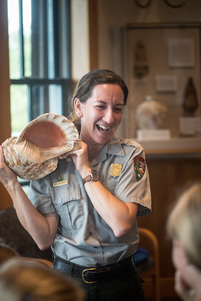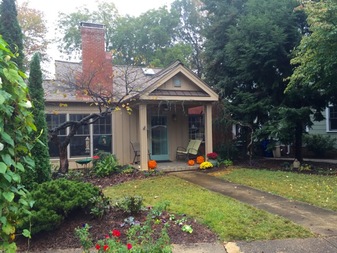 I am working today on Maria Beotegui's story. Maria is an Argentine immigrant to South Florida. As I try to relate the story she told us on our visit to Biscayne Bay, I think about what she and her family have brought with them from Argentina to the US. Maria, her mother and her brother are all National Park Rangers. Theirs is a quintessentially American story of struggle, difficulty, hard work and ultimately - success. Maria's passion is bringing the rich world of Biscayne Bay to urban youth in the Miami-Dade area, many of them immigrants or children of immigrants. As I will note in her story, Maria understood at an early age the differences in culture between the fast-paced world she lived in here and the Argentine culture she left behind. She notes how striking it was, on a visit back to Buenos Aires to visit family when she was a youth, how happy people seemed to be despite living with so much less than people do here in the US. This is not the first time I have heard that theme expressed. My own son Sam said as much when he returned from a church youth group trip to Matanzas, Cuba when he was 16. He marveled at how open, how loving youth were in Matanzas - both with each other and with their new American friends - and yet how little material wealth they had in comparison to their visitors. Maria's goal is not only to understand this difference so she can relate to her young constituents in Miami, but to help her own children find honest happiness in their own hearts in the midst of this bounty of material wealth in the US. Maria also talks about her South Florida landscape as being "family". She says "I love nature anywhere I go. I really don’t feel out of place or uncomfortable anywhere in nature. But if you are with your family, it's different. That’s how I feel at Biscayne. I am with my family. I know the names of all the trees and I’ve known them all my life, and the salt water here it flows through my veins. I've gone swimming in the water, I’ve looked under the rocks. It’s a big part of me, of who I am, and I can’t imagine being too far away from it for too long. Like family." In a time of fear, where we are considering all outsiders as a threat, I try to remember the look in Sam's eyes as he talked about his journey to Cuba. It was hard for him to believe that people could welcome him so openly, so lovingly. I think it really changed him, and he's a better, kinder person for it. Perhaps it's because the Cubans Sam met, the Argentinians Maria visited, felt like they had very little to lose. What they had, no outsider could threaten - love, laughter, family. As we look toward immigrants with a wary eye, I think it is important to remember that our suspicion is perhaps filtered through a burden of stuff that we are worried they may ultimately take from us. If we stop for a moment and think about what they might bring to us - love, laughter, family - maybe our better nature might win out over our fear. In a Pew Research Poll taken earlier this year about half (51%) of the respondents say immigrants today strengthen the country because of their hard work and talents, while 41% say immigrants are a burden because they take jobs, housing and health care. The share saying that immigrants strengthen the country has declined six percentage points since last year and I suspect would be even smaller in the wake of the Paris attacks and the exodus from Syria. We are scared that immigrants are somehow going to take something from us. We measure their benefit in terms of hard work and talents, but I think we forget what else they bring with them, particularly from Latin cultures - the sense of happiness that comes from feeling like we are all part of a family. We care for each other, we get to know each other, and we give each other help when it's needed. That's what family is all about. This week, the French were our brothers and sisters, and we stood in solidarity with them as they struggled through tragedy, just as they did for us after the 9/11 attacks. But it was not long ago that the French were not particularly revered in this country. Remember "freedom fries"? But just as we embraced them, we stiff-armed Syrian refugees who, arguably, have suffered even more greatly from terror and loss. I envision America to be a place where visitors from other places can arrive here and marvel at how happy people are, whether we are well-off or not. I am not certain it is that kind of place today. Moving into this year's Thanksgiving week, I hope we all can remember what to really be thankful for - people - who love us, laugh with us, help us when we are in need. I am thankful for my family, for my friends who are like family to me, for the place where I live. Like Maria, I feel connected to it just like family.
0 Comments
 Our house in Raleigh's Five Points neighborhood. Our house in Raleigh's Five Points neighborhood. My wife Loretta and I, and our children Linnea and Sam, have lived in this house, in this neighborhood in Raleigh, since 1992 when Sam was 2 years old. During this time the 'hood has evolved. The property values have grown dramatically, and more than once in the span of time that we lived here we have considered cashing out and moving someplace else. But we haven't. Because, to be honest, there is no better place on earth than the one we are embedded in. Yes, we could probably have had a big house with a larger porch on a plot of land that gives me opportunity to grow all those dwarf conifers I have always wanted. We could have the "play room" in the basement that our children have always pointed out in other people's houses. We could have a garage. No, we really don't need a garage. Our choice was to embed ourselves in a place - both the micro-place within our four walls and a more macro-place in what we call our neighborhood. It is this embedded connection to place that we simply could not duplicate if we cashed out and sought another house in another neighborhood, no matter how "nice". Our house was smallish to raise two children, but we did it without sacrificing much. Now as our daughter prepares to leave for college and beyond it is perfect. No "down-sizing". What we gained were relationships with people around us - many of those who participated in Sam's play group when he was a toddler (he's 25) are still around. We went to the funeral of one young man this past year. We've watched our neighbors across the street renovate their house, live a young person's life for a while (they traveled a lot) and now raise their little boy and advance in their respective careers. We've watched the big sweet gum across the street come down (Thank you, Jesus...no more gum balls!) and many of the dogwoods die, even as our hemlock has grown from Christmas tree size to forest material. We've watched Halloween become such an event that we have to close off both ends of the street so there is room for the pig-picking before the young'uns set out on their trick-or-treating. We've seen our own house get re-built stick by stick from the inside as we changed and molded it to our personalities and lifestyle, and our little yard start out with a play structure and swings in the back and evolve into a big screened porch, a terrace and fire pit for us and for Linnea's teenage friends. People are adding on and even tearing some houses down and replacing them. A wistfulness rises only to be tamped down by the reality of our neighborhood as a living thing - constantly changing. That is a good thing. It is a common practice in this culture where houses are a commodity, supported by a governmental subsidy for taking on greater mortgage interest, to consider them disposable - our neighborhoods the same. When things get rough we cash out. I've heard the wisest way to grow wealth from this "investment" is to sell your house after a few years, buy another one, then re-sell it and keep on doing this until you've accumulated the largest possible house you can imagine in the best possible neighborhood. The reason a large house is valued more than a small house is that we buy and sell our homes by the square foot, roughly comparable to selling your car by the pound. Because of this headlong rush toward turning our homes into commodities and investments, we are losing the human connection to the landscape of both home and neighborhood that so characterized this country for so many generations. We paint everything beige to please the next owner (who probably doesn't like beige any more than we do). Part of what has made our relationship with this particular micro-landscape so valuable has been our ability to watch our children grow here, to watch other people's children grow, to be part of the gestalt of a place that is more than the sum of its houses. We've benefited in ways not easily measured from our connection to this place. What we may have given up in square footage and equity we have more than gained back in memories, in history, in meaning that these brick walls and narrow sidewalks hold for us. This is why we don't sell the American National Parks for development, and go off and buy a bigger piece of land with the proceeds. There is meaning in these places. They are unique and we all benefit from being in them - soaking up the history of a place, of a people. We lose it when land and buildings become only a vessel for growing wealth. So think about sending down a few roots. Make your money on the stock market or buy a lottery ticket and re-introduce yourself to your home - make the connection. |
AuthorDaniel Howe lives in Raleigh, NC. He's interested in a lot of things so this blog is all over the place. Archives
May 2018
Categories |
City Planning / Public Process
|
|

 RSS Feed
RSS Feed
